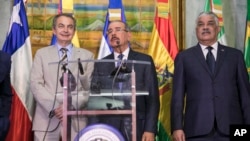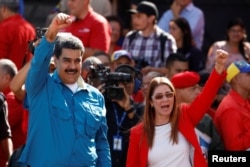Negotiations between Venezuela's government and opposition have broken down after they failed to reach an agreement on a formula for the upcoming presidential election.
Talks aimed at resolving Venezuela's grinding political and economic crisis have been taking place for weeks in the Dominican Republic. But the uphill effort fell apart with the two sides accusing one another of grandstanding and negotiating in bad faith.
Dominican President Danilo Medina, one of the international mediators, said Wednesday that the talks had entered an "indefinite recess" after government negotiators left the Caribbean island Tuesday night, having signed a draft agreement that was unacceptable to the opposition.
The head of the opposition's delegation, Julio Borges, urged the government to reconsider its stance while reiterating that he wouldn't sign an agreement that put Venezuela's democracy at risk. He called on Venezuela's government to accept the opposition's counterproposal.
"If the government wasn't afraid of a free election, it would have no choice but to sign our document, which is based on Venezuela's laws," said Borges, vowing to make the counterproposal public in the coming hours.
Before hundreds of cheering supporters in Caracas, President Nicolas Maduro signed a draft of the agreement that the opposition coalition had rejected. But he added that the dialogue remained alive.
In the absence of a deal, Venezuela's rancorous fight for power could become a lot uglier.
Possible boycott
The Constituent Assembly, which is controlled by the government but considered illegitimate by the U.S. and many foreign governments, has called for elections to take place by the end of April, though it had stopped short of setting a date to give negotiations a chance.
If the government goes ahead with the vote, the opposition — or large parts of it — may decide to boycott the contest, making sure that many countries won't recognize the results. It could also prompt the U.S. to follow through on a threat to cut off oil shipments from the OPEC nation.
Secretary of State Rex Tillerson, who is wrapping up a tour of the region, said Wednesday en route to Jamaica that he was more favorable now to the idea of oil sanctions because the situation on the ground had steadily worsened.
"We're going to take it to him and let him make the decision," said Tillerson, referring to President Donald Trump.
Four-digit inflation and widespread shortages of everything from cash to food have collapsed support for Maduro's socialist administration.
But he's betting he can still win re-election after having sidelined several prominent opponents and crushed anti-government protests last year that left more than 130 people dead. The government also controls the National Electoral Council,whose credibility to oversee the contest has been questioned by the opposition following two elections last year that were marred by allegations of fraud and vote-rigging.
Chief government negotiator Jorge Rodriguez said earlier that the two sides worked out the last remaining details of a deal in marathon talks Monday in Caracas and were expected to return to the Caribbean Island on Tuesday to ratify it. But he alleged that U.S. agents out of the Colombian capital of Bogota had ordered the opposition to stand down, an accusation Borges rejected out of hand.





